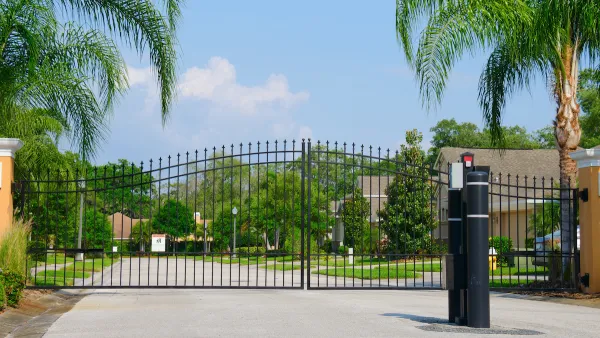CityLab stages a humorous competition for the location of a likely-to-go-horribly-wrong tourist attraction.
"Building a Jurassic Park would be a titanic undertaking for a city, with all the benefits and drawbacks of setting up a world-class zoological facility, developing an Ivy League research institution, and hosting the World Cup," writes Kriston Capps. "Only a few places are cut out for it."
By Capps's analysis, several tiers of cities deserve consideration for a Jurassic Park:
- "Let dinosaurs eat all the NIMBYs: San Francisco, New York, and Washington D.C." (Although I'm sure there are a few cities that might feel left out of this category, say Los Angeles.) For San Francisco, Capps imagines the outrage: "'A Mesozoic Moratorium in the Mission': The headlines write themselves."
- "Park in an evil-scientist hub: Boston, San Jose, or Research Triangle" Luckily for the people of Boston, "…unless things have changed since [Capps] was in middle school, dinosaurs are cold-blooded and can’t survive a Northeastern winter."
- "Bring the dinosaurs home—to Texas" Dinosaurs would mess with Texas.
Finally Capps settles on one particular city as the ideal candidate, but you'll have to click through the link to find out which it is.
FULL STORY: Where Should We Build Jurassic Park?

National Parks Layoffs Will Cause Communities to Lose Billions
Thousands of essential park workers were laid off this week, just before the busy spring break season.

Retro-silient?: America’s First “Eco-burb,” The Woodlands Turns 50
A master-planned community north of Houston offers lessons on green infrastructure and resilient design, but falls short of its founder’s lofty affordability and walkability goals.

Delivering for America Plan Will Downgrade Mail Service in at Least 49.5 Percent of Zip Codes
Republican and Democrat lawmakers criticize the plan for its disproportionate negative impact on rural communities.

Test News Post 1
This is a summary

Test News Headline 46
Test for the image on the front page.

Balancing Bombs and Butterflies: How the National Guard Protects a Rare Species
The National Guard at Fort Indiantown Gap uses GIS technology and land management strategies to balance military training with conservation efforts, ensuring the survival of the rare eastern regal fritillary butterfly.
Urban Design for Planners 1: Software Tools
This six-course series explores essential urban design concepts using open source software and equips planners with the tools they need to participate fully in the urban design process.
Planning for Universal Design
Learn the tools for implementing Universal Design in planning regulations.
EMC Planning Group, Inc.
Planetizen
Planetizen
Mpact (formerly Rail~Volution)
Great Falls Development Authority, Inc.
HUDs Office of Policy Development and Research
NYU Wagner Graduate School of Public Service





























